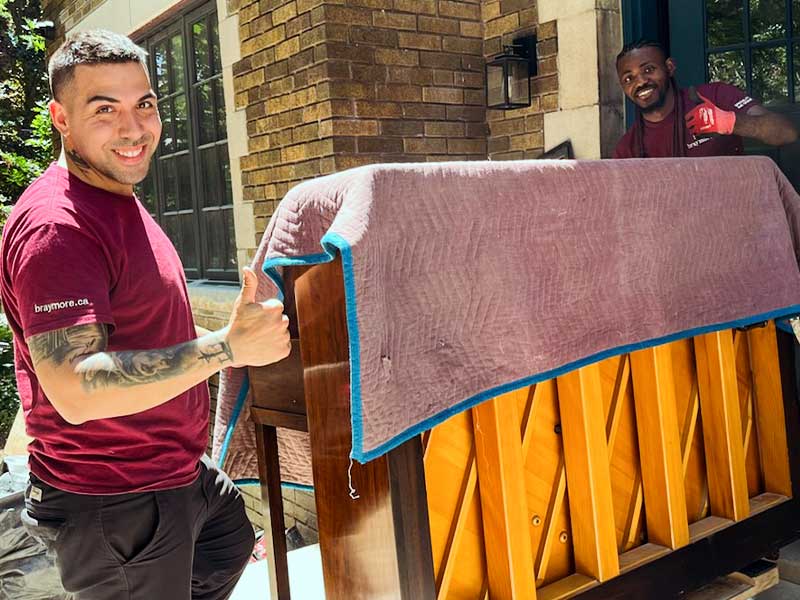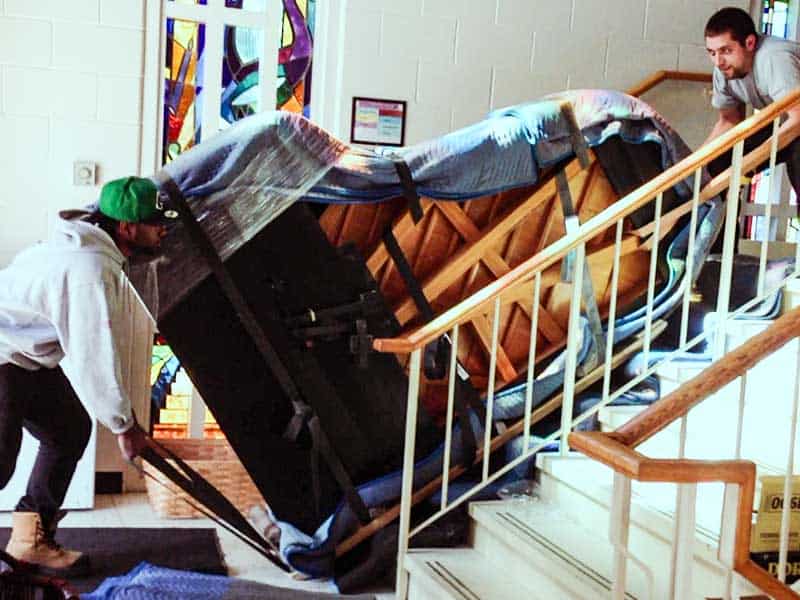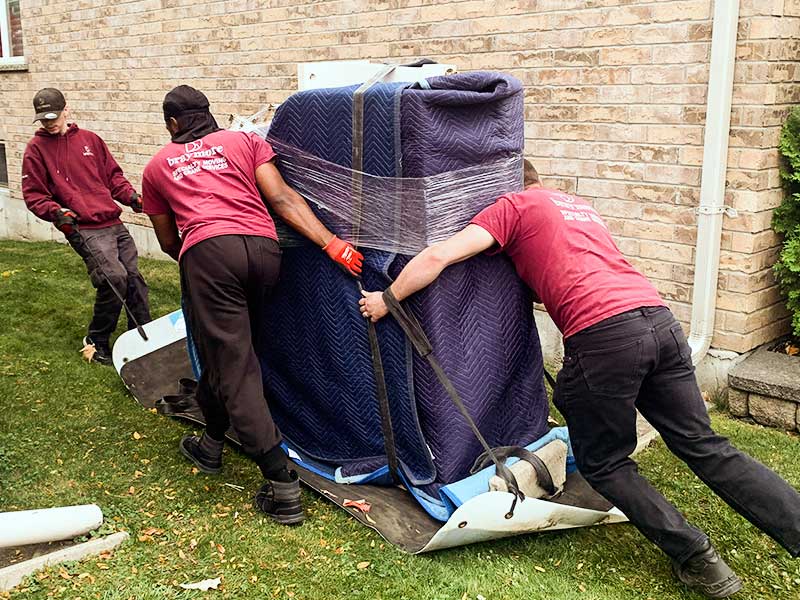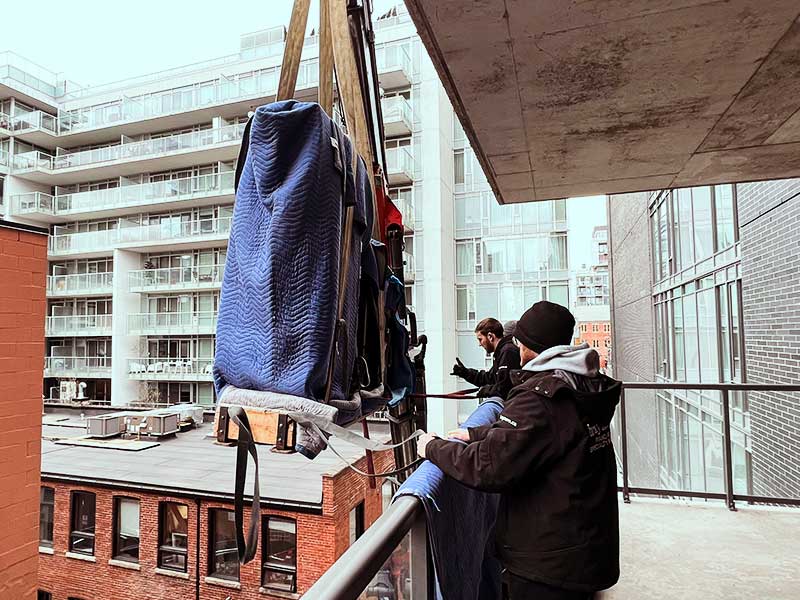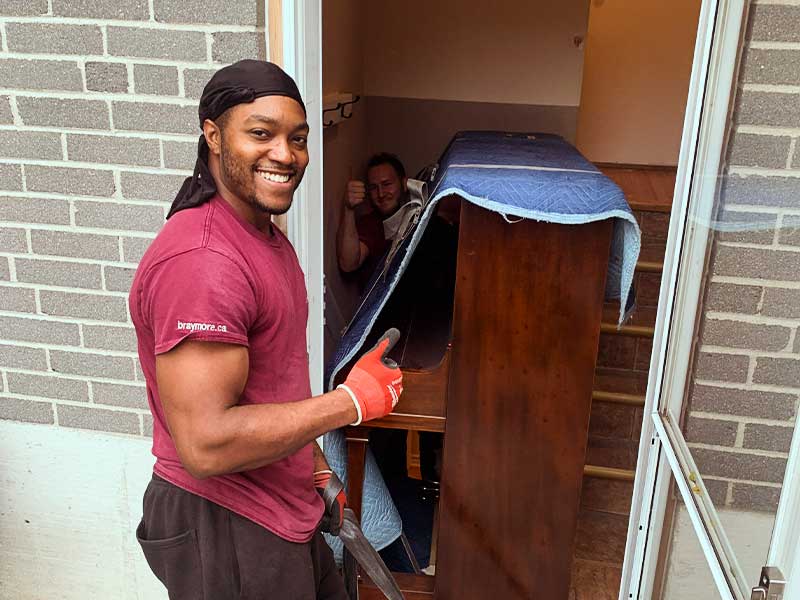Moving at a higher standard since 1981.
Braymore Piano Movers
Ontario’s most reliable piano moving service.
Piano moving Services
With over 40 years of piano moving experience, your piano is in safe hands.

Piano Moving
Whether its a nine-foot grand, upright or digital piano, our expertise and experience is unmatched.
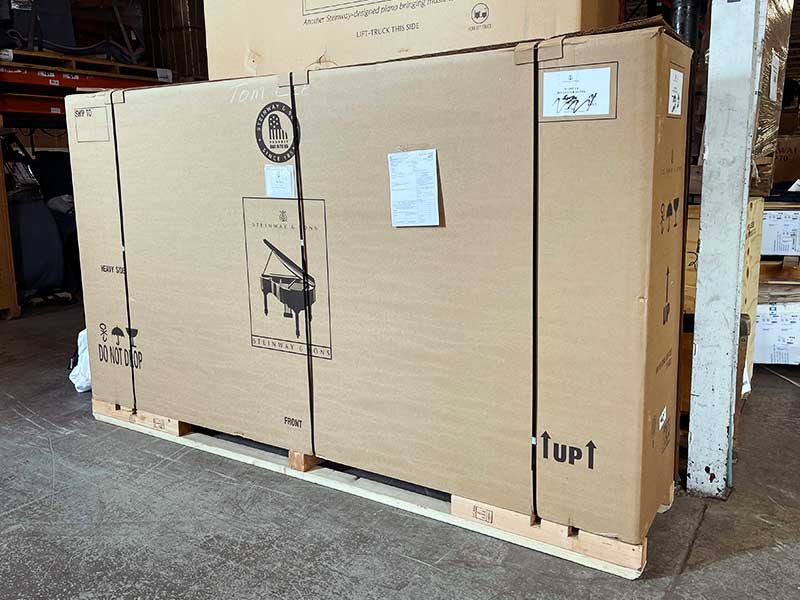
Piano Storage
Braymore has over 30,000 square feet of warehouse space across three facilities that store pianos.
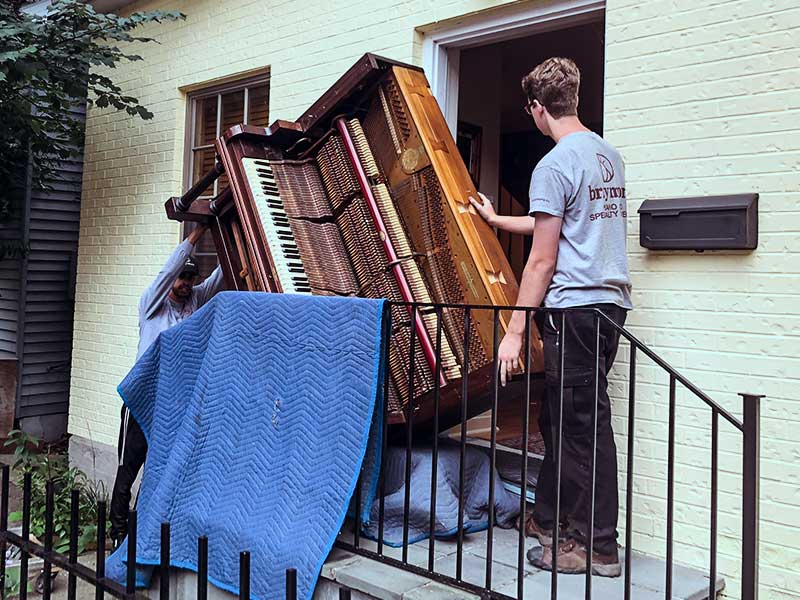
Piano Disposal
Is your old piano at the end of its life? Braymore piano movers will take it away to the local dump or a recycling facility.
Ontario’s piano movers.
Wherever you need a piano moved.
Ajax
Ancaster
Aurora
Barrie
Bracebridge
Brampton
Brantford
Burlington
Caledon
Cambridge
Collingwood
Cornwall
Georgetown
Gravenhurst
Halton Hills
Huntsville
Kingston
Kitchener
Maple
Markham
Midland
Milton
Mississauga
Muskoka
Newmarket
Niagara Falls
Oakville
Orangeville
Orillia
Oshawa
Ottawa
Peterborough
Pickering
St. Catherines
Stoney Creek
Toronto
Vaughan
Wasaga Beach
Waterloo
Whitby
Woodbridge
See for yourself…
If I could give them more than 5 stars, I’d give them 10 times that! Looking for someone to move my baby grand was a bit of a challenge, but when another piano moving company recommended them for the challenging stairs, you know there’s a reason. They were fantastic! They protected the piano, protected the stairs and house; everything that we thought would be a challenge ended up being smooth because their team discussed every move before making it. I can’t recommend them enough.
Very responsive, quick service, and moved our piano with ease. Everything was excellent. Their customer service was especially helpful and friendly. I will definitely use them again!
FAQ
Piano moving, like all trades, is a specialty in itself. The average upright piano weighs between 400 and 900 pounds. Grand pianos start at 650 pounds and can go up to 1300 pounds. Depending on the make, model, age, and condition of the piano, its value can vary from a couple of hundred dollars to half a million dollars.
For most people, their piano is one of their most prized possessions and getting it moved without damage is one of the most important things to them during moving time. This is why household movers do not include the piano in their general prices. You want movers who know what they are doing, who will move your piano with the care it deserves, and who will not damage your home or injure anyone. Moving a piano almost always requires it to be moved through a space with a tight squeeze (i.e. a door frame, staircase, etc.). I will never tell people they can not move their piano themselves.
Every person who wants their piano moved must ask, “Do I feel lucky?” and “What risks am I willing to take?”. Any person who has had an accident with their piano knows that when something goes wrong, it happens fast and when you least expect it. The repercussions of moving a piano by yourself or with an inexperienced person can cost you a small fortune or more stress than most people can take. You need a piano mover because you want someone who can anticipate every part of your move before the move starts.
Braymore Piano Movers has the experience and reputation for moving your piano correctly.
The first way, which is commonly used by the general public and a number of household movers, is by brute force. Manhandle the piano into a vehicle with 4 to 8 people from one location. If you are lucky, someone might have a dolly that can handle the weight safely, and hope that someone might remember to consider securing it into the vehicle so it doesn’t crash into things. Then, complete the move by manhandling it off the truck and moving it into its new place at the new location.
Professional piano movers and some household movers use the second way. They use 2 or 3 people to move the piano and are equipped with piano skids, pads, ramps, slings and the knowledge of how to move a piano safely. They use special techniques to manipulate the piano through the move and only require 4 to 6 people in the most challenging moves. The knowledge of how to move a piano safely isn’t learned overnight; it requires a master piano mover to drill in through repetition of what to watch out for and when to apply different piano moving techniques.
The first way has an extremely high damage rate and can take 2 to 20 times longer than the second way. I am a well-known professional piano mover. You can not imagine the number of times people’s jaws hit the floor when they see a professional move a piano after they have attempted it themselves in the past. They almost always say the exact same thing: “Never again will I attempt to move my own piano; I will always let the professionals handle it from now on”.
Call a professional piano mover today; you do not really need to know how to do it. Leave the “how to move a piano” to the real experts in piano moving! There are a lot of people and movers who claim they know how to move a piano. I would recommend spending your time on making sure you are getting a real professional piano mover. Want to make sure the Braymore Piano Movers are the real deal: just read our reviews and ask around. Braymore has been doing this since 1981. We have learned a lot over the years.
No. Any move always involves risk. Anyone who tells you otherwise is not being honest with you and is only telling you what you want to hear.
Any mover who tells you he has never damaged anything is either lying or extremely new to the profession. There could be an exception out there, but anyone who gambles would never take that bet.
You should hire a professional piano mover for the same reason you hire a professional in any other trade or buy insurance: To protect yourself from injury and liabilities and reduce the odds of your piano or home being damaged. Most people forget that when something gets damaged, it is usually more than one item. Do you like your house, walls, floors, porch, doors, etc? A good piano mover will tell you if there is a chance of damage in the move before he/she has started doing anything and will give you the option of proceeding. Please note that when this occurs, you are now liable for the damage, not the mover.
No.
Like any profession, there are people with different levels of experience, equipment, and integrity.
With Braymore Piano Movers, you are getting over 40 years of first-hand real experience, the right equipment, and integrity that can be easily confirmed across the industry.
Call the local stores, technicians, and teachers (people in the industry) and find out who they would use. After a couple of inquiries, it will become clear who the piano mover of choice is in your area. In most areas, there is usually only one good piano mover. In large metropolises, there could be more than one. In small rural areas, it will probably be a household mover who specializes in pianos due to the lack of volume. If you live near a large city, it is probably worth your while to have the expert drive out of the city and complete your piano move for you. It does not take a rocket scientist to realize that a piano mover in a big city has more experience moving pianos than a small town mover. (A larger community means more pianos to move, therefore more experience.)
If you are located in the Greater Toronto Area, you’ve already found the largest and most reputable piano mover in your area: Braymore. Just look at their reviews!
The true answer to this question will shock many people: No.
The buyer is responsible for ensuring that he/she is adequately insured, not the moving company. Just because the moving company says they are insured does not mean they are fully insuring your merchandise, moving, or telling you their maximum liability in a worst-case scenario.
Typical response: You threaten to sue the mover afterward. Guess what? Like you, the government has also set a default maximum liability clause to protect movers from ignorant consumers, and it does NOT provide full coverage. Never assume you are fully insured. Assume that you are not.
On top of this, there are three types of insurance to consider when people refer to insurance.
- Is the company insured against damage to property and or vehicles (commercial/automotive insurance)?
- Is the company insured against damage to the piano (cartage/content insurance)?
- Is the company insuring its workers against injury (WSIB, formerly known as Workman’s Compensation)?
When you ask the question, are they answering 1 & 2, 2 & 3, all of them, one of them, insuring for a single dollar or the full value of the item being moved? Never assume that all of these are being covered (unfortunately, most people do, and sometimes, they pay a dear price for it). Is there a legal document to show that the customer is insured? (Another important question that is almost never asked.) Ensure you know the company’s “Terms of Cartage” before you book your move (ask them for a copy). Is the mover providing a proper “Bill of Lading” with all the “Terms of Cartage” and insured values for your piano move? Most people do not realize that without a proper “Bill of Lading,” they are NOT fully insured and fall under local cartage laws, which are never more than a maximum of $2.00 per pound for the item being moved, do NOT cover their home and do NOT cover the workers. Just because a piano mover says they are fully insured does not mean you are adequately covered; unless a “Bill of Lading” is provided with the full declared value (insured value) written on it, you are exposed and definitely not covered. Using a REPUTABLE piano mover is extremely important because they take care of all these things for you. I should also mention that if you do not give an insured value to the mover before the move and have it recorded on the bill of lading, you default to the local cartage amounts automatically. It is not the mover’s responsibility to ensure you have the right amount of insurance. It is YOUR job. I should also note that most movers will charge extra for additional insurance.
The MOST IMPORTANT reason to use a REPUTABLE piano mover is insurance. These days, insurance has become an extremely touchy issue, whether car, home or business insurance. Due to rising premium rates, most people no longer claim insurance with their insurance companies. This same fact holds for businesses, especially piano movers. They have insurance policies to cover worst-case scenarios, but like you and most businesses, piano movers self-insure their more minor day-to-day claims. You want someone who will provide you with a “Bill of Lading” (legal document) at the beginning of the move so that you know where you stand and that the piano mover will stand behind any damages they might have incurred and repair those problems. Everyone has heard moving company nightmares at one time or another. No “Bill of Lading” and No “Reputable Mover” are recipes for your nightmares, can cost you a fortune, and give you your nightmare stories to share with friends and family.
Want to ensure proper insurance for your piano move? Call Braymore Piano Movers today and tell us what you require your piano to be insured for.
It is vital for you to know the answer to this question.
As an individual or business, you are responsible for ensuring that the company (piano mover) you hire is WSIB (Workplace Safety and Insurance Board, formerly Workman’s Compensation). Suppose you hire a company (piano mover) that is not covered. In that case, you are accepting FULL LIABILITY for any injured employees doing your job because the local authority will consider them your employees while handling work for you. This could include medical bills, lost wages, and a civil lawsuit. A company (piano mover) covered by WSIB (which they must have by Canadian law) will take care of most of these problems for you. Please note: Many small movers are currently trying to find loopholes, saying that it does not apply to them, by trying to pass that responsibility back onto you unsuspectingly.
Unfortunately, not all companies pay their required premiums, and like all insurance companies, WSIB will cut off or not cover all claims from delinquent companies or piano movers. To make sure that you are covered, ask the company (piano mover) you are hiring for a current WSIB clearance certificate (NOT MORE THAN 2 MONTHS OLD). This has become trickier because WSIB no longer wants to give them out to the general public, so you might have to request one through your business. They can also tell you immediately over the phone whether the piano mover is covered or not. It is also important to note that if you are a business that uses a non-WSIB-covered company (piano movers) and gets audited by WSIB, you could be liable for those WSIB premiums that were not paid while you were using them. You should visit their website to verify current information and changes about WSIB.
The last thing to remember is if you are using a small mover that works out their home. There is a good chance that they are not covered properly. This ratio changes from city to city, but this stereotype is generally true.
This is a commonly asked question for which you may hear many different answers. This question is asked because many people say their piano sounds different in its new location.
The answer to the question may or may not surprise you. No, not directly.
The moving does NOT directly affect the sound of the piano. What makes it sound different here versus there if it is not the moving? And why does it not hold tune or hold tune better here? The answer lies with the piano technicians and furniture makers. A piano is made of wood and steel. Wood is directly affected by “Temperature” and “Humidity”. Steel is directly affected by temperature. When these two elements change, so does your piano. The more these two elements change, the more frequently you must regulate and tune your piano. It does not take a significant shift to change the sound of your piano, and you should consult your manufacturer’s website to see what type of environment is best for your piano.
I will never forget a story from one of our customers for whom we were moving a pre-tuned piano from a piano store to a concert hall on one of the coldest days in winter. When we delivered his piano, it was cold and obviously out of tune due to the temperature change outside. When the piano warmed up again in the concert hall, it came back into tune because it was a similar environment to the piano store it came out of. That was all in the span of 3 hours. It went from in tune to out of tune to back into tune.
Another reason your piano may sound different is the size of the room and its acoustics. The carpet absorbs sound, while hardwood reflects sound. Sound reinforces in small spaces, seeming louder, and gets lost in larger spaces, seeming quieter. Unless the two rooms are identical, the piano should be expected to sound different in its new space.
Piano moving is billed one of two ways: hourly or flat rate. The professional cost of renting a piano is a flat rate based on the following factors:
1. The type of piano
Is it a grand piano (what size?) an upright piano or a digital piano?
2. The distance of the move
3. The difficulty of the move
Are there stairs (are they straight; is there an angle, etc.), tight turns or rough terrain (rocks, gravel, grass, etc.)?
4. The number of people required based on the difficulty
The more difficult the move, the more people will be required to help ensure the safety of our movers and your piano.
5. Time restraints
Will you need us during a very limited window of time? Is it a challenge season for a move (winter)?
6. Waiting time that might be incurred on the mover
Were you available when the move was scheduled? Did our mover have to wait before being able to move the piano?
This depends greatly on when you need to have your piano moved, where you are located, and whether it is date-sensitive.
Most piano movers will book on a first-come, first-serve basis. If it is an in-demand day, you could require over a month’s notice to get the day you want. If it is not, your move could be booked as quickly as tomorrow.
I recommend booking well in advance if you need a specific day.
In the Greater Toronto Area, the average booking time is a couple of days to two weeks, assuming you have some flexibility as to which day your piano can be moved. When you need your move done on a specific date, please note that the more notice you give, the better your odds of getting the required day.
Whatever you do, don’t wait till the last minute! As soon as you know the date, you should book your move.

